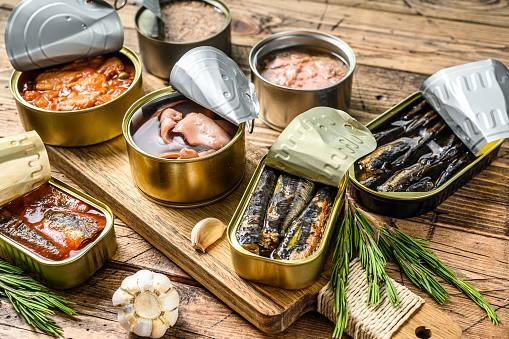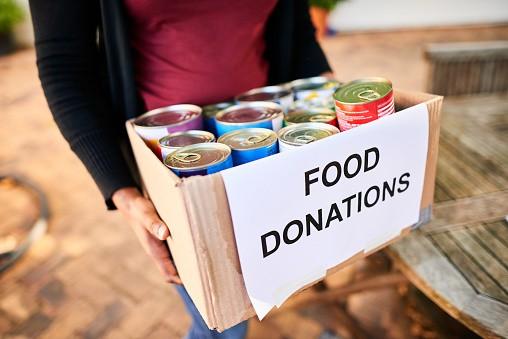Expiry dates are not something new. You must have come across different foods in stores with varied shelf life, and canned foods are not an exception. Some manufacturers may use sell-by, expiry date, or best before, which tends to confuse consumers. Nevertheless, the shelf life of these products helps buyers to determine the quantity of purchase depending on their frequency of use. But at times you may do your math wrong. So how long is canned food good for after expiration date?
So you end up buying more than you need in a bid to save money. Then the reality hits you when you open your pantry and find out that some of the products have gone wrong the moment you badly need to use them? And there you are, puzzling whether to use or not. Does this sound familiar to you? Then don’t go anywhere as we are going to lift the veil and uncover all the canned food expiry date mystery.
But before then, let’s have an overview of how the canning process is done.

How The Canning Process Is Done?
Canning is not something new. The innovation dates back to the 18th century. For example, in 1974, chemists at the National Food Processors Association (NFPA) analyzed the products for bacterial contamination and nutrient value.
For years now, manufacturers have relied upon this method to preserve different foods for a long without adding any preservatives.
Typically, the process involves heating the processed food under high heat to kill bacteria and micro-organisms. The cans are sealed under high pressure and then heated under steam pressure. The time may vary depending on the type of food being canned.
Most consumers lack enough knowledge of how food is processed and canned. This has brought some misconceptions around canned food and its safety. Keep reading to understand the food chemistry surrounding canned foods.
How Is The Expiry Date Of Canned Foods Determined?
How long does canned food last? Or what’s the safety date that ensures the best quality or peak quality of food? Manufacturers do not have the right to determine the expiry date for canned foods. Only the FDA can determine the expiry date of foods after examining their quality, nutritional quality, and packaging standards. Before then, specific tests have to be done to determine whether consumer quality standards are met.
But in most cases, canned foods will have a shelf life of 1 to 4 years. This can be doubled from 3 up to 6 years in the case of shelf-stable foods like shelf-stable milk and low acid canned goods. The high acid canned goods have a different case.
The essence of having expiry dates on canned foods is basically to give suppliers and consumers an idea of how long the food will retain its quality. Expiry data also gives stores a better way of managing their stocks by ensuring the products are arranged in regards to their shelf life.
However, while canned foods have a longer shelf life, there are factors that determine their expiry date. And among them include:
1. Storage Conditions
Though canned food may have a longer shelf life, the way you store them matters. High temperatures encourage bacterial growth. So the more you subject your product to heat the lower the shelf life. For opened cans, bacteria may even grow inside, making the food contaminated over time.
2. Transportation
The way canned foods are transported matters a lot and can massively impact the shelf life of the food. For instance, if the cans are handled poorly during transportation and in any case, they get damaged or broken. This can create small invisible holes that may go unnoticed. With time, bacteria will grow inside affecting its shelf life.
How To Extend Your Canned Food Shelf Life?
Most people have misconceptions about canned food shelf life and do not think beyond their expiry dates. And they think, “Does canned food expiration dates be extended to prevent food waste?” While the manufacturer may put a sell-by time for the product, the shelf life can be extended by storing the product under the right conditions.
Studies have indicated that the shelf life of canned food can be doubled by storing them in a freezer. But if you do not have one, you can still extend it by storing the can in a dry, cool place away from light and heat. So that means your pantry shouldn’t be the first storage option for your canned food. This is because temperatures inside your pantry keep on changing, which will eventually lower your food shelf life.
Why Should You Look Beyond Expiry Date?
Most people find themselves stranded when they come across products in the cupboards that have overstayed or expired. Some even go to the extent of tossing them. But in the real sense, these products are not bad as we think.
The expiry date simply indicates the duration at which the food can supply high-quality nutrients. So that implies that the nutritional content of the food will be low past the stamped date, but it is still fit for human consumption. Canned food that has expired can last up to 1 year or 2 depending on the storage conditions. There are some indicators of food safety that you can follow to estimate the expiry of canned goods.
However, before you eat canned food, there are some things you need to confirm if it’s okay by doing the following.

1. Check The Color
When packaged foods goes bad, the color will start changing. You may notice a moldy or strange appearance. In case any different color is noted aside from the one you are used to, then the food is not fit for consumption.
2. Smell It
Aside from color, you can also smell it. If you notice a strange odor that is not pleasing to the nose other than the normal product smell then, it’s time to bin your food. Also, note that both smelling and color observation should be done when the can is open.
Other signs of spoiled canned food include
- A can with corroded parts
- Bubbling is indicated by small gas or bubble moving upwards in the jar when the can is opened
- Gushing liquid when the can is opened
- A broken seal or bulging can
- A liquid that oozes under the can
What You Can Do With Your Expired Canned Food?
Many people just throw away expired canned food, but there are actually a lot of things you can do with them. The good news is that most food usually doesn’t expire. It can be eaten even after the expiration date.
These dates are not actually mandated by the Food and Drug Administration and, unless it’s on infant formula, the dates on packages are voluntarily provided by the manufacturers. So, canned goods past their “best-by” dates and are are actually safe to eat indefinitely.
But some foods like beans and peanuts should not be eaten past the expiration dates. So check your store’s expiration dates or look it up to find out when you should use certain foods by.
1. Donate To Food Banks
One way to take advantage of your expired canned food is to donate it to any local food bank or food pantry around your area before throwing it away in the trash bin. Food collecting truck companies will come by every few months at designated areas in most communities accepting donated items like canned goods, blankets, and other useful items like toiletries and clothes that they distribute. If its indicators are good, then you can donate it.

2. Compost Them
You can compost your expired food too by doing it yourself or through a local composting company. But make sure you know what foods are allowed and not allowed in compost piles before dumping them.
When using a composter bin, make sure you don’t add too many acidic materials such as lemon peels, oranges, pineapple skin because these can affect the quality of the soil after some time. Just remember to use only canned vegetables scrap and peelings for composting since household meat scraps should be thrown away with everything else in the garbage.
3. Empty And Recycle The Cans
Empty your cans before throwing them away by rinsing them with water until there is no more food residue left inside. Make sure you collect all the parts like pop-tops and lids for recycling too because it’s non-recyclable materials like cans and plastic bottle caps that take up most of our landfill space every year.
If you don’t have a recycling bin yet, simply get in touch with your local recycling company if you don’t have time to do it yourself to find out how they can help you recycle your trash or what other non-recyclable items they can recycle on your behalf.
4. Bin Them
If you don’t have any use for your expired canned food, just throw it out together with all your other non-recyclables instead in the bin to save some space for composting later on if you want. When they’re of no use, disposing of them is the only solution.
Conclusion
Expired canned food is not bad for human consumption. Contamination is what causes health complications. So next time before you toss those expired cans, make sure you have tasted, smelled, and even checked if indeed they are spoiled.
